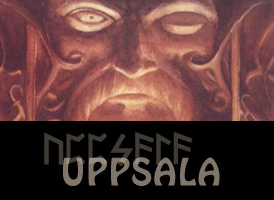
Odin
Loki
Berserkergang
Valkyries
Alfish Worship
Runes
Asatru
Factions in Asatru
Heathen
Mysticism
Please help me continue to write new books, write new blog posts, and keep this site ad-free:
by Wayland Skallagrimsson
Recently I had a conversation that shocked me. A Folkish heathen had written to me, and managed to avoid all the things that Folkish heathens usually do that make me ignore everything they have to say. He did not scream insults, threaten my life, or act like a braying jackass. Instead he was intelligent, polite, and interested in holding an adult conversation. He wished to have an open and honest debate concerning Folkism in general, and my words on it in particular.
I'm a fairly simple man, with a very simple set of rules for interacting with others. In general, I treat people the way they treat me. When some stranger pops up out of nowhere and offers insult, I show that person no respect myself. When, as this person did, someone wants to talk about something intelligently, I do so. I can't say that either of us changed the other person's mind, but we managed to understand something about each other's positions that neither of us had before.
It was the other man who saw it first. In the course of our exchanges, he realized that we were each using a completely different definition of "religion." He realized that this meant that he and I were talking past each other, and that we actually saw the world itself so differently that there was no point in continuing the debate. He also saw, though, that the difference we had discovered was important.
To me, religion is about the relationships that we have with the gods and other important wights, such as the landwights and the ancestors. It is about the duties we have to the Outgarths, and the benefits we receive from them. I make no claims about what the gods are, whether they literally exist or exist only in our stories. Whatever the nature of the gods, religion is about our relationship with them. Most heathens that I know, Tribalists like myself, see religion this way.
To him, which he says is also true of the vast majority of Folkish practitioners, religion is something completely different. It has little to do with our relationships with the gods or other wights. Few Folkish types, he says, believe in the gods in any literal way. Few of them even think that much about them in any way at all. To them, he says, religion is primarily a cultural social institution. It is a way of transmitting and encoding culture norms and ideals. It provides a basis for identity, a way of saying "us" as opposed to "them." This view of religion focuses primarily on the group of worshippers as opposed to the gods.
I have some problems with this. To go from this premise to the anti-race beliefs held by most Folkish practitioners is still a confusion of culture, which is memetic, and race, which is genetic. It still fails to take into account the fact that the ancient heathens were not Folkish. Indeed, my opponent admitted that he could not respond to any of my six disproofs. However, that being said, I can see where the guy is coming from.
It is a valid enough definition of religion, one that many anthropologists and sociologists would agree with. I disagree with it, but respect it as one of the many opinions of the world held by people who are different than I am. It does indicate that the issue of Folkism will never be resolved in any real sense. By my definition, by the definitions of most non-Folkish heathens, these people aren't even religious. By their terms, we are not practicing their religion. There is no common ground on even the most fundamental of levels. Therefore, there is no way we will ever be able to argue them into genuine heathen religion (using my definition of religion). There is no way they will ever get us to adopt their people-oriented cultural rituals and drop our spiritual beliefs. East is East, and West is West, and ne'er the twain shall meet.
I post this tale for two reasons. One is that my adversary in this debate earned my respect. I have spoken publicly against Folkish beliefs in no uncertain terms. Fairness then dictates that I be equally as public about showing respect where it is earned. The other reason is as a heads-up to my fellow Tribalists. There is no point in debating on religious grounds with the Folkish contingent. We lack a common frame of reference. Instead, the fight for the heathen identity will better be won by concentrating on the positive aspects of our own beliefs. Where conflict and debate with Folkish practitioners is necessary, the best tactic is to make this difference in definition of religion very clear. Then shift to more academic arguments about the difference between culture and race, and the non-Folkish beliefs of the ancients.